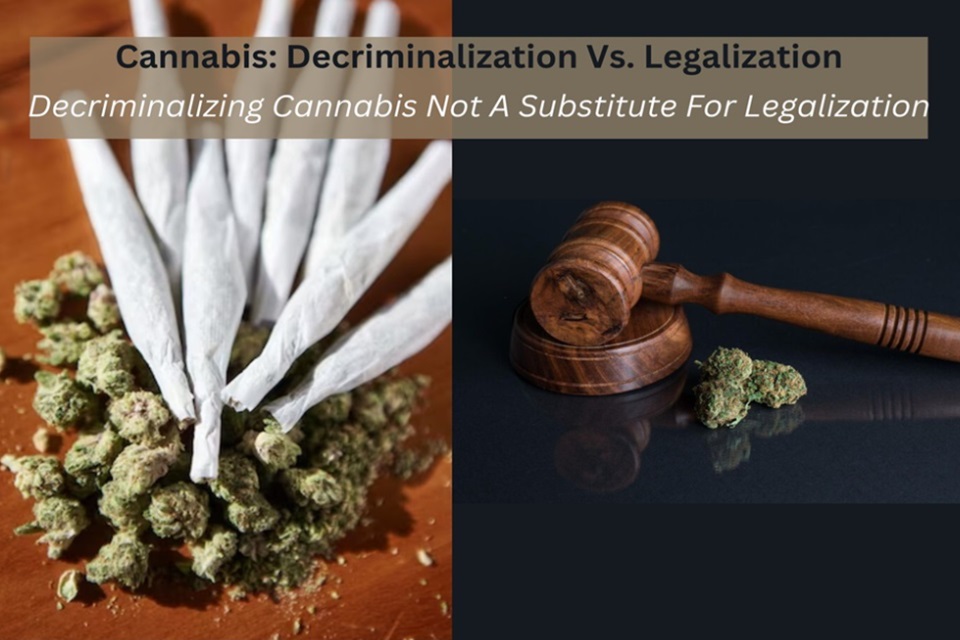An Overview: Decriminalizing Cannabis Not A Substitute For Legalization
In a groundbreaking move, London Mayor Sadiq Khan has greenlit a cannabis decriminalization trial in three boroughs. As discussions around cannabis policy continue, it’s crucial to dissect the nuances between decriminalization and legalization. Beyond the headlines, this article delves into the implications of decriminalization, emphasizing that it should not serve as an alternative to full-scale legalization. Learn the intricacies of both approaches, challenging preconceived notions and shedding light on the potential consequences.
Cannabis: Decriminalization Vs. Legalization
While decriminalization has seen success in countries like Portugal, where it led to reduced crime rates and drug-related deaths, it fails to address the persisting black market issue. Decriminalization inadvertently allows criminal drug gangs to maintain control, contributing to the rise of potent strains. In contrast, legalization, as seen in Canada, offers a regulatory framework, introducing age restrictions and potency limits. By dismantling the black market, legalization provides a comprehensive solution to the challenges posed by cannabis consumption.
Legalization’s Potential Breakdown Of The Black Market
Legalization, despite initial concerns, has demonstrated its ability to regulate the cannabis market effectively. Drawing parallels with Canada, where recreational cannabis has been legal for over three years, this approach has the potential to eradicate the black market. Through stringent regulations on age and potency, governments can ensure a safer and more controlled environment for cannabis users. While age restrictions are not foolproof, they serve as a proactive measure, aligning with successful models from other regulated substances like alcohol and tobacco.
The Need For Progressive Drug Policy Reform
Acknowledging the necessity for drug policy reform is imperative. While decriminalization may seem like a positive step, it falls short of addressing the root causes. True progress lies in embracing a legal, regulated market. The outdated stigma surrounding cannabis must be dismantled, allowing for evidence-based policies that prioritize public health and safety. The road to reform may be long, but avoiding complacency and striving for a system that outshines mere decriminalization is essential.
Positives & Negatives Of Cannabis Reform
The positives of cannabis reform are evident in the potential for reduced crime rates, improved public health outcomes, and the economic benefits of a regulated market. However, challenges include the need for careful regulation, potential misuse, and societal adjustments. A balanced approach is crucial, ensuring that the positives outweigh the negatives. By learning from international experiences and implementing well-considered policies, the path to a progressive cannabis landscape becomes clearer.
In Summary
In the dynamic landscape of cannabis reform, both decriminalization and legalization present opportunities and challenges. While decriminalization might offer immediate relief from criminalization, it lacks the comprehensive approach of legalization. Legalization, with its regulatory prowess, stands as a transformative force against the persistent black market. A nuanced, evidence-based policy considering public health, safety, and societal dynamics is key. As we navigate this path, it’s essential to keep an eye on the ultimate goal: a cannabis landscape that prioritizes responsible use and contributes positively to society.
Frequently Asked Questions (FAQs)
Q: Does decriminalization eliminate the black market for cannabis?
A: No, decriminalization may inadvertently perpetuate the black market, allowing criminal elements to maintain control.
Q: How does legalization address the potency issue of cannabis?
A: Legalization allows for regulatory measures, including setting potency limits and reducing the health risks associated with high-potency strains.
Q: Are age restrictions effective in a legalized cannabis market?
A: Age restrictions, while not foolproof, provide a framework for controlling access and reducing potential risks, as seen with alcohol and tobacco.
Q: Can the positive outcomes of cannabis legalization be replicated globally?
A: While context matters, lessons from countries like Canada suggest that regulated legalization can help break down the black market.
Q: Does legalization encourage cannabis use among younger individuals?
A: Legalization provides an opportunity for education and responsible use, similar to approaches taken with other regulated substances like alcohol.





